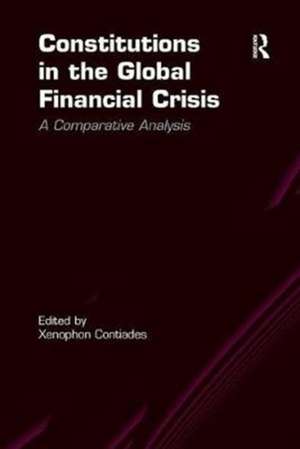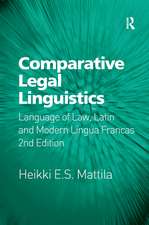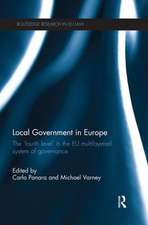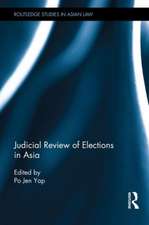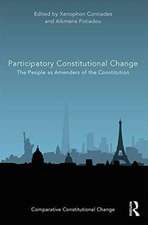Constitutions in the Global Financial Crisis: A Comparative Analysis
Autor Xenophon Contiadesen Limba Engleză Paperback – 11 noi 2016
| Toate formatele și edițiile | Preț | Express |
|---|---|---|
| Paperback (1) | 469.34 lei 6-8 săpt. | |
| Taylor & Francis – 11 noi 2016 | 469.34 lei 6-8 săpt. | |
| Hardback (1) | 1064.70 lei 6-8 săpt. | |
| Taylor & Francis – 23 mai 2013 | 1064.70 lei 6-8 săpt. |
Preț: 469.34 lei
Nou
Puncte Express: 704
Preț estimativ în valută:
89.84€ • 97.62$ • 75.51£
89.84€ • 97.62$ • 75.51£
Carte tipărită la comandă
Livrare economică 21 aprilie-05 mai
Preluare comenzi: 021 569.72.76
Specificații
ISBN-13: 9781138255708
ISBN-10: 113825570X
Pagini: 316
Dimensiuni: 156 x 234 mm
Greutate: 0.45 kg
Ediția:1
Editura: Taylor & Francis
Colecția Routledge
Locul publicării:Oxford, United Kingdom
ISBN-10: 113825570X
Pagini: 316
Dimensiuni: 156 x 234 mm
Greutate: 0.45 kg
Ediția:1
Editura: Taylor & Francis
Colecția Routledge
Locul publicării:Oxford, United Kingdom
Notă biografică
Xenophon Contiades is Professor of Public Law, School of Social and Political Sciences, University of Peloponnese and Director of the Centre for European Constitutional Law-Themistocles and Dimitris Tsatsos Foundation, Athens, Greece.
Recenzii
’This timely book is indispensable reading for anyone concerned with the dramatic challenges the democracies and systems of government around the world are facing as a result of the global financial crisis and politics of austerity.’ Robert Blackburn, King’s College London, UK ’Few see any substantial connection between the global financial crisis and national constitutions. But, in this impressive and timely book, a strong collection of talented constitutional experts from Europe and North America reveal the essential dynamics of this connection and scrutinize the varying responses to the crisis under different constitutional regimes. It offers a provocative and penetrating comparative analysis that should be read by financial scholars and constitutional jurists alike.’ Allan C. Hutchinson, York University, Canada ’This book provides the first comprehensive effort to address the relationship between the financial crisis in western democracies with constitutional developments. It is an invaluable contribution that provides an important framework for further study, including consideration of the external factors and non-governmental forces that are bending constitutions in crisis.’ Timothy Canova, Nova Southeastern University, USA
Cuprins
Introduction The Global Financial Crisis and the Constitution; Part I Constitutional Reactions in Comparative Perspective; Chapter 1 How Constitutions Reacted to the Financial Crisis; Part II First Path: Adjustment; Chapter 2 The Constitution and the Financial Crisis in Ireland, David Gwynn Morgan; Chapter 3 The Constitutional Consequences of the Financial Crisis in Italy, Tania Groppi, Irene Spigno, Nicola Vizioli; Chapter 4 Financial Crisis and the Constitution in Latvia, Ringolds Balodis, Janis Pleps; Chapter 5 The Spanish Constitution in the Turmoil of the Global Financial Crisis, Agustín Ruiz Robledo; Chapter 6 The Constitution and the Financial Crisis in the UK: Historical and Contemporary Lessons, John F. McEldowney; Part III Second Path: Submission; Chapter 7 The Impact of the Financial Crisis on the Greek Constitution, Xenophon Contiades, Ioannis A. Tassopoulos; Chapter 8 The Sovereign Debt Crisis and the Constitution’s Negative Outlook: A Portuguese Preliminary Assessment, Jónatas E.M. Machado; Part IV Third Path: Breakdown; Chapter 9 Breaking and Making Constitutional Rules: The Constitutional Effects of the Financial Crisis in Hungary, Zoltán Szente; Chapter 10 The Impact of the Financial Crisis on Icelandic Constitutional Law: Legislative Reforms, Judicial Review and Revision of the Constitution, Björg Thorarensen; Part V Fourth Path: Stamina; Chapter 11 The United States Constitution and the Great Recession, Mark Tushnet;
Descriere
This book includes contributions from prominent experts on Greece, Hungary, Iceland, Ireland, Italy, Latvia, Portugal, Spain, the UK, and the USA providing a critical analysis of the effects of the financial crisis on the constitution. The volume’s extensive comparative chapter pins down distinct constitutional reactions towards the financial crisis, building an explanatory theory that accounts for the different ways constitutions responded to the crisis. How and why constitutions formed their reactions in the face of the financial crisis unravels throughout the book.
